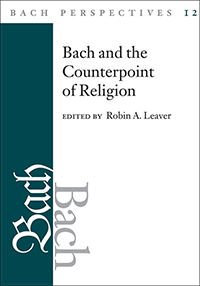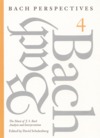
Bach Perspectives
Bach Perspectives, inaugurated in 1994, is the leading English-language serial publication devoted to Bach studies. New volumes appear, on average, every other year, and feature cutting-edge research by top scholars in the field. Vols. 1–4 were published by the University of Nebraska Press in collaboration with the American Bach Society. Beginning with volume 5, the series is published by the University of Illinois Press in collaboration with the American Bach Society. Volumes 1–14 are now available open access thanks to a subvention from the Ruth and Noel Monte Fund of the American Bach Society.

Bach Perspectives 14: Bach and Mozart, Paul Corneilson, ed. (University of Illinois Press, 2022)
Click here for more information and to order
Available online and open access
- Eleanor Selfridge-Field: The Keyboard Transcriptions of J. S. Bach and J. G. Walther
- Yoel Greenberg: Precedents for the “Secondary Development” from Bach to Mozart and Their Implications for Understanding Early Sonata Form
- Noelle M. Heber: A Pursuit of Wealth: The Freelance Endeavors of Bach and Mozart
- Stephen Roe: Johann Christian Bach’s German Heritage
- David Schulenberg: Mozart, J. C. Bach, and the Bach Tradition
- Michael Maul: Doles and the Prefect of the Choir: New Observations on Mozart’s Visit to the Thomasschule

Bach Perspectives 13: Bach Reworked, Laura Buch, ed. (University of Illinois Press, 2020)
Click here for more information and to order
Available online and open access
- Markus Zepf: Reworking Fischer: Some Observations about Johann Sebastian Bach and Johann Caspar Ferdinand Fischer
- Moira Leanne Hill: Repaying Debt with Interest: The Revision of Borrowed Movements in C. P. E. Bach's Passions
- Erinn E. Knyt: The Bach-Busoni Goldberg Variations
- Stephen A. Crist: Bach as Modern Jazz
- Ellen Exner: Certifying J. S. Bach's Interplanetary Funkmanship; or, What Bach Meant to Bernie Worrell

Bach Perspectives 12: Bach and the Counterpoint of Religion, Robin A. Leaver, ed. (University of Illinois Press, 2018)
Click here for more information and to order
Available online and open access
- Mark Noll: Historical Proximity: John Wesley Visits Leipzig in 1738
- Joyce L. Irwin: Dancing in Bach’s Time: Sin or Permissible Pleasure?
- Robin A. Leaver: A Catholic Hymnal for Use in Lutheran Leipzig: Catholisches Gesang-Buch (Leipzig, 1724)
- Janice B. Stockigt: Liturgical Music for a New Elector: Origins of Bach’s 1733 Missa Revisited
- Markus Rathey: Bach’s Christmas Oratorio and the Mystical Theology of Bernard of Clairvaux
- Derek Stauff: The Church under Persecution: Bach’s Cantatas for the Fourth Sunday after Epiphany
- Rebecca Cypess: Music Historicism: Sara Levy and the Jewish Enlightenment

Bach Perspectives 11: J. S. Bach and His Sons, Mary Oleskiewicz, ed. (University of Illinois Press, 2017)
Click here for more information and to order
Available online and open access
- Robert L. Marshall: Father and Sons: Confronting a Uniquely Daunting Parental Legacy
- Mary Oleskiewicz: Keyboards, Music Rooms, and the Bach Family at the Court of Frederick the Great
- David Schulenberg: C. P. E Bach’s Keyboard Music and the Question of Idiom
- Evan Cortens: Voices and Invoices: The Hamburg Vocal Ensemble of C. P. E Bach
- Christine Blanken: Recently Rediscovered Sources of Music of the Bach Family in the Breitkopf Archive

Bach Perspectives 10: Bach and the Organ, Matthew Dirst, ed. (University of Illinois Press, 2016)
Click here for more information and to order
Available online and open access
- Lynn Edwards Butler: Bach’s Report on Johann Scheibe’s Organ for St Paul’s Church, Leipzig: A Reassessment
- Robin A. Leaver: Bach’s Choral-Buch? The Significance of a Manuscript in the Sibley Library
- George B. Stauffer: Miscellaneous Organ Trios from Bach’s Leipzig Workshop
- Christoph Wolff: Did J. S. Bach Write Organ Concertos? Apropos the Prehistory of Cantata Movements with Obbligato Organ
- Gregory Butler: The Choir Loft as Chamber: Concerted Movements by Bach from the Mid- to Late 1720s
- Matthew Cron: Music from Heaven: An Eighteenth-Century Context for Cantatas with Obbligato Organ

Bach Perspectives 9: J. S. Bach and His German Contemporaries, Andrew Talle, ed. (University of Illinois Press, 2013)
Click here for more information and to order
Available online and open access
- Wolfgang Hirschmann: “He Liked to Hear the Music of Others”: Individuality and Variety in the Works of Bach and His German Contemporaries
- Steven Zohn: Aesthetic Mediation and Tertiary Rhetoric in Telemann’s VI Ouvertures à 4 ou 6
- Andrew Talle: Bach, Graupner, and the Rest of Their Contented Contemporaries
- Alison J. Dunlop: The Famously Little-Known Gottlieb Muffat
- Michael Maul: Bach versus Scheibe: Hitherto Unknown Battlegrounds in a Famous Conflict

Bach Perspectives 8: Bach and the Oratorio Tradition, Daniel R. Melamed, ed. (University of Illinois Press, 2011)
Click here for more information and to order
Available online and open access
- Christoph Wolff: Under the Spell of Opera? Bach’s Oratorio Trilogy
- Daniel R. Melamed: Johann Sebastian Bach and Barthold Heinrich Brockes
- Markus Rathey: Drama and Discourse: The Form and Function of Chorale Tropes in Bach’s Oratorios
- Kerala J. Snyder: Oratorio on Five Afternoons: From the Lübeck Abendmusicken to Bach’s Christmas Oratorio
- Laurence Dreyfus: The Triumph of Instrumental Melody: Aspects of Musical Poetics in Bach’s St. John Passion
- Eric Chafe: Bach’s Ascension Oratorio: God’s Kingdoms and Their Representation

Bach Perspectives 7: J. S. Bach’s Concerted Ensemble Music, The Concerto, Gregory G. Butler, ed. (University of Illinois Press, 2007)
Click here for more information and to order
Available online and open access
- Gregory Butler: Bach the Cobbler: The Origins of J. S. Bach’s E-Major Concerto (BWV 1053)
- Pieter Dirksen: J. S. Bach’s Violin Concerto in G Minor
- David Schulenberg: The Sonate auf Concertenart: A Postmodern Invention?
- Christoph Wolff: Sicilianos and Organ Recitals: Observations on J. S. Bach’s Concertos

Bach Perspectives 6: J. S. Bach’s Concerted Ensemble Music, The Ouverture, Gregory G. Butler, ed. (University of Illinois Press, 2007)
Click here for more information and to order
Available online and open access
- Joshua Rifkin: The “B-Minor Flute Suite” Deconstructed: New Light on Bach’s Ouverture BWV 1067
- Jeanne Swack: A Comparison of Bach’s and Telemann’s Use of the Ouverture as Theological Signifier
- Steven Zohn: Bach and the Concert en ouverture

Bach Perspectives 5: Bach in America, Stephen A. Crist, ed. (University of Illinois Press, 2003)
Click here for more information and to order
Available online and open access
- Barbara Owen: Bach Comes to America
- Matthew Dirst: Doing Missionary Work: Dwight’s Journal of Music and the American Bach Awakening
- Michael Broyles: Haupt’s Boys: Lobbying for Bach in Nineteenth-Century Boston
- Mary J. Greer: “The Public … Would Probably Prefer Something that Appeals Less to the Brain and More to the Senses”: The Reception of Bach’s Music in New York City, 1855–1900
- Hans-Joachim Schulze: “A Lineal Descendant of the Great Musician, John Sebastian Bach”?: Bach Descendants in the United States and the Problem of Family Oral Tradition
- Christoph Wolff: Descendants of Wilhelm Friedemann Bach in the United States
- Peter Wollny: On Miscellaneous American Bach Sources
- Carol K. Baron: “Father Knew (and Filled Me Up with) Bach”: Bach and Ives—Affinities in Lines and Spaces
- Stephen A. Crist: The Role and Meaning of the Bach Chorale in the Music of Dave Brubeck

Bach Perspectives 4: The Music of J. S. Bach: Analysis and Interpretation, David Schulenberg, ed. (University of Nebraska Press, 1999)
Click here for more information and to order
Available online and open access
- Alfred Mann: Introduction: Bach’s Orchestral Music
- Gregory G. Butler: The Question of Genre in the Fourth Brandenburg Concerto
- Jeanne Swack: Modular Structure and the Perception of Ritornello in Bach’s Brandenburg Concertos
- John Koster: The Harpsichord Culture in Bach’s Environs
- Mary Oleskiewicz: The Trio Sonata in the Musical Offering: A Salute to Frederick the Great’s Tastes and Quantz’s Flutes
- David Schulenberg: Versions of Bach: Performing Practices in the Keyboard Works
- William Renwick: “39 Praeludia et Fugen del Signor Johann Sebastian Bach”: The Langloz Manuscript
- Paul Walker: Fugue in the Music-Rhetorical Analogy and Rhetoric in the Development of the Fugue
- John Butt: Bach Recordings from 1980 to 1995: A Mirror of Historical Performance

Bach Perspectives 3: Creative Responses to Bach, from Mozart to Hindemith, Michael Marissen, ed. (University of Nebraska Press, 1998)
Available online and open access
- Ludwig Finscher: Bach’s Posthumous Role in Music History
- Thomas Christensen: Bach among the Theorists
- Robert L. Marshall: Bach and Mozart’s Artistic Maturity
- William Kinderman: Bachian Affinities in Beethoven
- Walter Frisch: Bach, Brahms, and the Emergence of Musical Modernism
- Stephen Hinton: Hindemith, Bach, and the Melancholy of Obligation

Bach Perspectives 2: J. S. Bach, the Breitkopfs, and Eighteenth-Century Music Trade, George B. Stauffer, ed. (University of Nebraska Press, 1996)
Available online and open access
- George B. Stauffer: Introduction: The Breitkopf Family and its Role in Eighteenth-Century Publishing.
- Ernest May: Connections between Breitkopf and J. S. Bach
- Andreas Glöckner: Church Cantatas in the Breitkopf Catalogs
- Hans-Joachim Schulze: J. S. Bach’s Vocal Works in the Breitkopf Nonthematic Catalogs of 1761 to 1836
- Yoshitake Kobayashi: Breitkopf Attributions and Research on the Bach Family
- Peggy Daub: The Publication Process and Audience for C. P. E. Bach’s Sonaten für Kenner und Liebhaber
- Neal Zaslaw: The Breitkopf Firm’s Relations with Leopold and Wolfgang Mozart
- Yoshitake Kobayashi: On the Identification of Breitkopf’s Manuscripts
- George R. Hill: Identifying Breitkopf House Copies Produced by the Firm’s Own Scribes: A Preliminary Survey
- Robert M. Cammarota: The Magnificat Listings in the Early Breitkopf Nonthematic Catalogs
- Gregory G. Butler: Johann Gottlob Immanuel Breitkopf: The Formative Years
- Ortrun Landmann: Breitkopf’s Music Trade as Reflected in the Holdings of the Sächsische Landesbibliothek
- George B. Stauffer: The Thomasschule and the Haus “zum Goldenen Bären”: A Bach-Breitkopf Architectural Connection

Bach Perspectives 1, Russell Stinson, ed. (University of Nebraska Press, 1995)
Available online and open access
- David Schulenberg: Composition and Improvisation in the School of J. S. Bach
- Russell Stinson: The Compositional History of Bach’s Orgelbüchlein
- Michael Marissen: Concerto Styles and Signification in Bach’s First Brandenburg Concerto
- Eric T. Chafe: Anfang und Ende: Cyclic Recurrence in Bach’s Cantata Jesu, nun sei gepreiset, BWV 41
- Stephen A. Crist: The Question of Parody in Bach’s Cantata Preise dein Glücke, gesegnetes Sachsen, BWV 215
- James A. Brokaw II: The Perfectability of J. S. Bach, or Did Bach Compose the Fugue on a Theme by Legrenzi, BWV 574a?